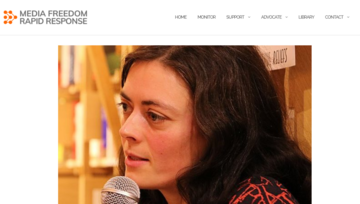
On 22 January 2021, Jean Chéritel, the CEO of the Chéritel group, a fruit and vegetable wholesaler in the Brittany region of France, dropped his defamation action against freelance investigative journalist, Inès Léraud. The legal threat related to Léraud’s investigation, published in Basta! on 26 March 2019, which shed light on alleged illegal practices of the company. The manner by which the lawsuit was dropped echoes a previous lawsuit brought against Léraud by Christian Buson, a Breton agri-food business owner, who also dropped his lawsuit a few days before the start of the trial in January 2020. While the MFRR welcomes the dropping of Mr Chéritel’s defamation action, we note the enduring chilling effect of vexatious legal threats and SLAPP actions (Strategic Lawsuits Against Public Participation) to encourage journalists to self-censor, regardless of the initiation of any actual court proceedings.
Across Europe, in countries such as France, Italy, Germany, Albania, Malta, Poland, Croatia and Hungary, prominent business leaders and politicians continue to threaten journalists, media workers and outlets with costly legal threats with the goal of silencing critical and independent journalism. Whether through defamation, privacy and abuse of data protection laws (based on the EU General Data Protection Regulation, GDPR), reporting in the public interest is too often vulnerable to SLAPPs and other legal threats designed to exhaust legal and financial resources, exert psychological pressure and isolate the journalist (especially pronounced if they are freelance), while also sending a signal to other media actors to avoid the topic. In much the same way as seen in both threats against Inès Léraud, the intention of vexatious legal threats is not to test the allegations in court. The possibility of potentially ruinous court action when coupled with long and resource-intensive pretrial proceedings, requiring specialised legal support all contribute to an environment that enables wealthy and influential litigants to stifle critical and independent journalism.
In Poland, the use of legal threats like these has increased and mimics the increase in attempts to marginalise and intimidate independent journalism and consolidate state (or pro-state) dominance. Leading independent outlet, Gazeta Wyborcza is facing over 55 legal threats and since 2018, OKO.press have been targeted by numerous vexatious lawsuits brought by wealthy business people, companies and politicians, including a Supreme Court judge, the Polish National Foundation and the World War II Museum in Gdansk. As highlighted by Piotr Pacewicz, founder and editor in chief of OKO.press, legal threats are both reactive and proactive: ‘this involves more than settling a specific dispute. It sends a message: “Beware, you can’t do all that you want”’. Not only do legal actions threaten the defendants, they encourage others to avoid topics or influential actors or step back from investigative journalism itself. This sentiment was reiterated by the Syndicat National des Journalistes (SNJ) when standing in support of Inès Léraud and Basta!: ‘Beyond the legal outcome, the purpose of these “gag lawsuits” is to place a sword of Damocles over threatened editorial staff, and as a consequence discourage them from investigating’. This degrades the broader media environment, limits the amount of information that is available to the public and gives cover for corruption and abuses of power to flourish.
Maltese investigative journalist, Daphne Caruana Galizia was assassinated three years ago, yet there remain 25 active cases against her in Maltese courts. Even the foundation set up to continue her work has faced legal threats based on GDPR. The media landscape in Malta has long been skewed by threats such as these. Between 1 May and 26 June 2020, a US-based law firm, Lambert Worldwide and a UK-based law firm, Atkins Thomson sent legal letters to Times of Malta, MaltaToday, Malta Independent, Lovin Malta and The Shift News in relation to their reporting and journalistic enquiries into alleged connections between Turab Musayev and Yorgen Fenech.
While we welcome the dropping of the legal action against Inès Léraud, the impact of vexatious legal threats across Europe continues to exert an undue influence on press freedom. This is reinforced by the unknown scale of the issue as many journalists, media workers and outlets cannot go public with threats they have received for fear of repercussions or even more abusive lawsuits in retaliation.
The MFRR calls for all journalists and media workers to be protected against vexatious legal threats and to ensure laws cannot be abused to target and limit media freedom. This should also include national and Europe-wide legislative and non-legislative initiatives to introduce procedural safeguards and improve legal protection against SLAPP actions and to support journalists and others who are targeted, as also mentioned in the recent European Democracy Action Plan.
Signed:
ARTICLE 19
European Centre for Press and Media Freedom
European Federation of Journalists (EFJ)
Free Press Unlimited
International Press Institute
Osservatorio Balcani Caucaso Transeuropa
Tags: SLAPP France Defamation and Libel
This content is part of the Media Freedom Rapid Response (MFRR), a Europe-wide mechanism which tracks, monitors and responds to violations of press and media freedom in EU Member States and Candidate Countries. The project is co-funded by the European Commission.


